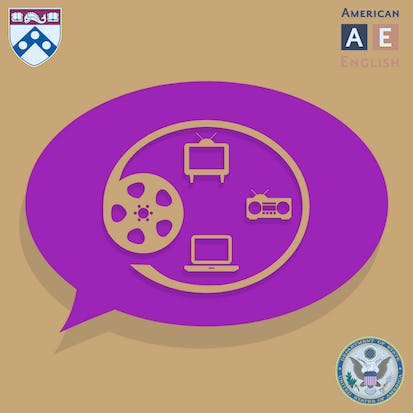- Level Foundation
- Duration 42 hours
- Course by University of Pennsylvania
-
Offered by

About
Welcome to English for Media Literacy, a course created by the University of Pennsylvania, and funded by the U.S. Department of State Bureau of Educational and Cultural Affairs, Office of English Language Programs. To enroll in this course for free, click on "Enroll now" and then select "Full Course. No certificate." This course is designed for non-native English speakers who are interested in learning more about U.S. media literacy. In this course, you will explore different types of mass media, such as newspapers, magazines, television, and social media. This course will also give you the opportunity to develop a broader understanding of the role media plays in our lives, while building your vocabulary and giving you the language skills needed to analyze what you read and watch. The first unit in this course will provide an introduction to media literacy and give you an opportunity to evaluate your own media literacy level. In unit 2, you will learn how to identify facts versus opinions in the media. The next unit in the course will focus on the differences between social media and traditional media, while unit 4 will look at how gender and identity are covered in the media. In the final unit of the course, you will demonstrate your increased media literacy by through a culminating final project on social media. Development of this course was funded by the U.S. Department of State Bureau of Educational and Cultural Affairs Office of English Language Programs. Unless otherwise noted, all course materials are available for re-use, repurposing and free distribution under a Creative Commons 4.0 Attribution license.Modules
Introduction
2
Videos
- Course Overview: Introduction to Media Literacy
- Course Overview: Topics, Assessments, Games & Activities
1
Readings
- Overview of the Unit
Media in Today's World
4
Assignment
- Check Your Understanding: William Cowen Interview
- Game 1: Preview the Text
- Unit 1 Assessment 1: Self-Assessment of Media Literacy Skills
- Value Affirmation Activity
4
Videos
- Media is Everywhere
- Listening: Interview with William Cowen...
- Language Focus: Previewing Texts
- Unlockable Achievement 1
Media Literacy
4
Assignment
- Check Your Understanding: "Can you Separate Fact from Fiction?"
- Check Your Understanding: "Debate over Free Press in Ukraine Suffers from Old Stereotypes"
- Game 2: Skimming and Scanning
- Game 3: Vocabulary Practice
1
Discussions
- Assessment 2: Family/Friend Media Usage Interview Findings
6
Videos
- What is Media Literacy?
- Part 1: How Can we Analyze Media Messages?
- Unlockable Achievement 2
- Part 2: How Can we Analyze Media Messages?
- Language Focus: Skimming and Scanning
- Online Learning Opportunities to Extend Your Skills
4
Readings
- BASIC: Can you Separate Fact from Fiction?
- ADVANCED: Can you Separate Fact from Fiction?
- BASIC: Debate over Free Press in Ukraine Suffers from Old Stereotypes
- ADVANCED: Debate over Free Press in Ukraine Suffers from Old Stereotypes
Bonus Additional Resources
4
Assignment
- Check Your Understanding: "More to it! Media Literacy"
- Game: Review Previewing a Text
- Check Your Understanding: "Make up your Own Mind. These Mobile News Apps Can Help."
- Game: Review Skimming and Scanning
3
Readings
- Game: Unit 1 Vocabulary Flashcards
- Supplemental Reading: More to it! Media Literacy
- Supplemental Reading: Make up your Own Mind. These Mobile News Apps Can Help.
Understanding and Comparing Media Types
3
Assignment
- Game 1: Categorize each Media Example with Its Type (Traditional or Social)
- Check Your Understanding: "Study Finds Most Americans Get News from Social Media"
- Game 2: Replace the Adjective with a Comparative Form
1
Peer Review
- Unit 2 Assessment 1: Compare Traditional and Social Media
4
Videos
- What is Traditional Media?
- What is Social Media?
- Unlockable Achievement 3
- Language Focus - Comparative Adjectives
2
Readings
- Overview of the Unit
- Study Finds Most Americans Get News from Social Media
The Pros and Cons of Social Media
4
Assignment
- Check Your Understanding: "5 Ways Social Media Helps Syrian Refugees"
- Game 3: Choose the Correct Reduced Form
- Check Your Understanding: "Real or Not? Snowboarder's Video in Question"
- Game 4: Vocabulary Review: Fill in the Blank
1
Discussions
- Assessment 2: Tweet
7
Videos
- Overcoming Bias: The Power of Social Media
- Using Social Media to Support Causes
- Language Focus - Reductions
- Part 1: The Reliability of Social Media (Editing/Doctoring Content)
- Unlockable Achievement 4
- Part 2: The Reliability of Social Media (Credibility)
- The Language of New Media
3
Readings
- BASIC: 5 Ways Social Media Helps Syrian Refugees
- ADVANCED: 5 Ways Social Media Helps Syrian Refugees
- Real or Not? Snowboarder's Video in Question
Bonus Additional Resources
5
Assignment
- Checking Your Understanding: "EU Piles Pressure on Social Media Over Fake News"
- Check Your Understanding: "The Town that Runs on Twitter"
- Game: Grammar Practice - Reductions
- Check Your Understanding: "It's about How you Communicate your Message"
- Game: Identify the Positive Aspects of Social Media from the Sentence Bank
4
Readings
- Game: Unit 2 Vocabulary Flashcards
- EU Piles Pressure on Social Media Over Fake News
- Supplemental Reading: The Town that Runs on Twitter
- Supplemental Reading: It's about How you Communicate your Message
Targeting Audiences
5
Assignment
- Check Your Understanding: Interview with Nancy Bollinger
- Check Your Understanding: "AI Cameras Aim to Guess Shopper’s Age, Sex and Mood"
- Game 1: Match the Target Audience with the Product
- Game 2: Put the Adjectives in the Correct Order
- Unit 3 Assessment 1: Advertising, thinking critically about ads, and targeting audiences
6
Videos
- What is Advertising?
- Thinking Critically about Advertisements
- How do Advertisers Target Audiences?
- Listening: Interview with Nancy Bollinger
- Unlockable Achievement 5
- Language Focus - Order of Adjectives
2
Readings
- Overview of the Unit
- AI Cameras Aim to Guess Shopper’s Age, Sex and Mood
Traditional Advertisements: Print, Radio and Television
2
Assignment
- Game 3: Choose the Correct Intensifier
- Check Your Understanding: "Internet Ads Outpace Print for First Time"
3
Videos
- Features of a Print Advertisement
- Features of Radio and Television Advertisements
- Language Focus - Intensifiers (Normal vs. Strong Adjectives)
2
Readings
- BASIC: Internet Ads Outpace Print for First Time
- ADVANCED: Internet Ads Outpace Print for First Time
Online Advertisements
1
Assignment
- Check Your Understanding: "Nielsen's, Sina Weibo Team Up for Closer Look at Chinese Social Media"
1
Peer Review
- Unit 3 Assessment 2: Written Analysis of Advertisement
5
Videos
- Using the Internet to Advertise
- Analyzing Advertisements
- Sample Analysis of an Advertisement
- Unlockable Achievement 6
- Unlockable Achievement 7
2
Readings
- Nielsen's, Sina Weibo Team Up for Closer Look at Chinese Social Media
- Written Assessment Instructions & Model Answer
Bonus Additional Resources
3
Assignment
- Check Your Understanding: "Digital Ads, Social Media Hide Political Campaign Messaging"
- Bonus Game: Intensifier Use
- Check Your Understanding: "New TV Advertisements Shock Viewers"
3
Readings
- Game: Unit 3 Vocabulary Flashcards
- Digital Ads, Social Media Hide Political Campaign Messaging
- New TV Advertisements Shock Viewers
Media Bias
2
Assignment
- Check Your Understanding: "For the Press, Elections are a Test of Accountability"
- Game 1: Choose the Correct Modal
1
Discussions
- Unit 4 Assessment 1: Opinions on Media Sources
5
Videos
- How Are Media Messages Created and Shared?
- What is Media Bias?
- Unlockable Achievement 8
- PART 1: Language Focus- Expressing Opinions using Modals (should, must, could, might)
- PART 2: Language Focus- Expressing Opinions using Modals (should, must, could, might)
3
Readings
- Overview of the Unit
- BASIC: For the Press, Elections are a Test of Accountability
- ADVANCED: For the Press, Elections are a Test of Accountability
Types of Bias in the Media
3
Assignment
- Check Your Understanding: "Are Facebook’s Trending Topics Unfair?"
- Game 2: Denotations and Connotations
- Game 3: Identifying Negative Connotations
1
Peer Review
- Unit 4 Assessment 2: Peer-Reviewed Media Bias
8
Videos
- Bias by Omission
- Unlockable Achievement 9
- Bias by Placement
- Language Focus - Connotation vs. Denotation
- Bias by Spin
- Overcoming Bias
- Overview for Unit 4 Assessment 2 & Sample Bias Analysis
- Unlockable Achievement 10
2
Readings
- Are Facebook’s Trending Topics Unfair?
- Instructions for Peer-reviewed Unit 4 Written Assessment 2
Bonus Additional Resources
4
Assignment
- Check Your Understanding: "Are Biased Sources Replacing News Networks?"
- Game: Bias by Omission, Placement, or Spin?
- Game: Positive/Neutral and Negative Connotations
- Check Your Understanding: "Facebook Checks Its Bias"
3
Readings
- Game: Unit 4 Vocabulary Flashcards
- Supplemental Reading: Are Biased Sources Replacing Standard News Networks in America?
- Facebook Checks Its Bias
Diversity
3
Assignment
- Check Your Understanding: "Minorities See Improvement, Demand more Diversity on US Television"
- Game 1: Choose the Correct Negative for the Sentence
- Unit 5 Assessment 1: True or False: Media Diversity
4
Videos
- What is Diversity?
- Why is it Important for the Media to be Diverse?
- Unlockable Achievement 11
- Language Focus: Using Negatives (not, no, never, hardly ever)
3
Readings
- Overview of the Unit
- BASIC: Minorities See Improvement, Demand More Diversity on US Television
- ADVANCED: Minorities See Improvement, Demand more Diversity on US Television
How are Different Groups Portrayed?
7
Assignment
- Check Your Understanding: "Study Examines Racial Bias in US Sports Reporting"
- Check Your Understanding: "Report: Americans Know Little about Native Americans"
- Checking Your Understanding: "UN to Advertisers: Go Beyond the Female Stereotypes"
- Check Your Understanding: "Social Media Highlights Sexism in Olympics Coverage"
- Game 2: Choose the Correct Transition
- Checking Your Understanding: "Rising Number of Chinese, Asian Faces in Hollywood"
- Game 3: Vocabulary Review
1
Peer Review
- Unit 5 Assessment 2: How Different Groups are Depicted in the Media
7
Videos
- Race and Ethnicity in the Media
- Culture in the Media
- Women in the Media
- Unlockable Achievement 12
- Language Focus: Transitions
- Diversity and Identity
- Course Conclusion
6
Readings
- Study Examines Racial Bias in US Sports Reporting
- Report: Americans Know Little about Native Americans
- UN to Advertisers: Go Beyond the Female Stereotypes
- BASIC: Social Media Highlights Sexism in Olympics Coverage
- ADVANCED: Social Media Highlights Sexism in Olympics Coverage
- Rising Number of Chinese, Asian Faces in Hollywood
Bonus Additional Resources
3
Assignment
- Check Your Understanding: "Women Journalists Keep the News Coming"
- Check Your Understanding: "Giving Voice to Sesame Street's First Afghan Muppet"
- Game: Review: Transitions in a Text
3
Readings
- Game: Unit 5 Vocabulary Flashcards
- Supplemental Reading: Women Journalists Keep the News Coming
- Supplemental Reading: Giving Voice to Sesame Street's First Afghan Muppet
Auto Summary
Welcome to "English for Media Literacy," a dynamic course offered by the University of Pennsylvania and supported by the U.S. Department of State Bureau of Educational and Cultural Affairs. Ideal for non-native English speakers, this course dives into U.S. media literacy, exploring various forms of mass media including newspapers, magazines, television, and social media. Participants will enhance their vocabulary and develop critical language skills to analyze media content effectively. The course unfolds in five comprehensive units: an introduction to media literacy and self-evaluation, distinguishing facts from opinions, comparing social media with traditional media, examining coverage of gender and identity, and culminating in a final project on social media. With a duration designed to fit into busy schedules, learners can choose from multiple subscription options including Starter, Professional, and Paid plans. This foundational-level course is perfect for anyone looking to deepen their understanding of media's role in society while improving their English proficiency. Join now for free by selecting "Full Course. No certificate" and embark on a journey to become media literate.

Lauren Fiori

Ian Nichols


